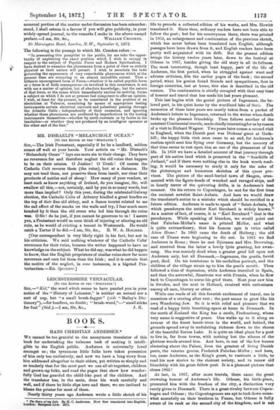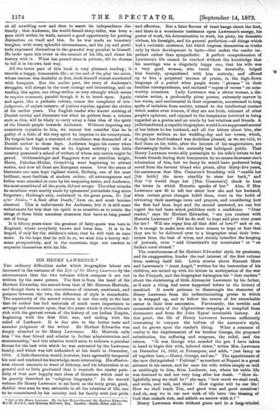BOOKS.
HANS CHRISTIAN ANDERSEN.* WE oannot be too grateful to the anonymous translator of this book for undertaking the toilsome task of making it intelli- gible to the English public. Andersen is universally loved amongst us ; the tyrannous little folks have taken possession of him only too exclusively, and now we have a long story from him addressed altogether to their elders, yet written so simply and so tenderly that for the most part we can all sit together, children and grown-up folks, and read the pages that show how wonder- fully God has guarded the child-like poet of the children. And the translator has, in the main, done his work carefully and well, and if there be little slips here and there, we are inclined to blame the printer for most of them.
Nearly thirty years ago Andersen wrote a little sketch of his
" The&oryojmyl4fa By H. O. Andersen. Now first translated into English. London: Sampson Low. PM.
life to precede a collected edition of his works, and Mrs. Howitt translated it. Since then, ordinary readers have not been able to follow the poet; but for his countrymen there, there was printed in 1855, an enlargement and continuation of the previous sketch, which has never before been translated into English, although passages have been drawn from it, and English readers have been pretty well acquainted with its drift. But the present edition brings the history twelve years later, down to the festival at Odense in 1867, besides giving the old story in all its fullness. The most interesting, though least happy, part of the life of Andersen, the first period, when he struggled against want and' adverse criticism, fills the earlier pages of the book ; the second' period, when his genius found friends and sympathisers, first in foreign countries, last at home, this also is described in the old' version. The continuation is chiefly occupied with that easy time of honour and travel that has made his last years pleasant.
This last begins with the genial picture of Ingemann, the be- loved poet, in his quiet home by the woodland lake of Sorii. The memories of these later years are mostly taken from a packet of Andersen's letters to Ingemann, returned to the writer when death broke up the pleasant friendship. Then follows another of the constant Continental travels, made chiefly interesting for us by reason of a visit to Richard Wagner. Two years later comes a second visit to England, when the Danish poet was Dickens' guest at Gads- hill ; the happy little visit soon came to an end, for Andersen's restless spirit sent him flying over Germany, but the memory of that time seems to rest upon him as one of the pleasantest of his life. In 1859 we have a detailed account of that journey through part of his native land which is preserved in the " Sandhills of Jutland," and if there were nothing else in the book worth read- ing, it would be necessary to study it only for the sake of the picturesque and humorous sketches of this queer pro- vince. The picture of the sand-buried town of Skagen, orna- mented with the figure-heads of wrecked and ravaged ships, and in hourly terror of the quivering drifts, is in Andersen's best manner. On his return to Copenhagen, he met for the first time the eminent novelist Saint-Aubain. And here we would draw the translator's notice to a mistake which should be rectified in a future edition. Andersen is made to speak of " Saint-Aubain, by which pseudonym the author Karl Bernhard is widely known." As a matter of fact, of course, it is "Karl Bernhard" that is the pseudonym. While speaking of blunders, we would point out that Paludan-Miiller's name is printed Moller, and what is quite extraordinary, that his famous epic is twice called Adam llama! In 1860 came the death of Heiberg ; the old race of Titans were beginning to die out. In 1861 we find Andersen in Rome ; there he met Bjornson and Mrs. Browning-, and received from the latter a lovely lyric greeting, her swan- song. She was scarcely dead when a greater grief fell upon not Andersen only, but all Den mark,—Ingemann, the gentle, fervid poet, died. On his tombstone is his medallion portrait, and the children of the village strain up to kiss the poet's mouth. Then followed a time of depression, while Andersen travelled in Spain, and then the sorrowful, disastrous war with Prussia, when he flew back to Copenhagen to nurse his grief there. Next year saw him in Sweden, and the next in Holland, received with enthusiasm among all men, literary or other.
While one reads of all this feverish excitement of travel, one is conscious of a craving after rest ; the poet seems to grow like his own Wandering Jew. So it is with relief and pleasure that we read of a happy little breathing-space at home in Denmark. In the north of Zealand the King has a castle, Fredensborg, whose very name is suggestive of peace. One walks up to it along an avenue of the finest beech-trees in the world, and behind, the grounds spread away in undulating richness down to the shores of the beautiful Esrom Lake. It is quite an ideal place for a poet to live in, far from towns, with nothing butthe silence of the glorious woods around him. And here, in one of the few houses- clustering about the Palace, lives the greatest of living Danish poets, the veteran genius, Frederick Paludan-Miiller ; and here, too, came Andersen, as the King's guest, to rusticate a little, to read his new stories to the choicest society, and to renew old friendship with his great fellow-poet. It is a pleasant picture that closes 1865!
At last, in 1867, after more travels, there came the great crowning honour of Andersen's life. Odense, his birth-place, presented him with the freedom of the city, a distinction very rarely given in Denmark. There is a great rivalry between Copen- hagen and Odense; the Copenhageners are apt to look down some- what scornfully on their brethren in Funeu, but Odense is fully aware of its rank as the second city of the kingdom, and is not
at all unwilling now and then to assert its independence dis- tinctly; that Andersen, the world-famed story-teller, was born a poor child within its walls, seemed a good opportunity for putting distinction on itself and him. So he was made an honorary burgher, with every splendid circumstance, and his joy and grati- tude expressed themselves in the graceful way peculiar to himself. He looks upon this event as the summit of his life, and closes his history with it. What has passed since is private, till he chooses to tell it in his own best way.
All the latter part of this book is very pleasant reading ; it records a happy, honourable life ; at the end of the play the actor, whose success was doubtful at first, finds himself almost smothered with bouquets. But the earlier part, the story of Andersen's struggles, will always be the most strange and interesting, and on reading this again, one thing strikes us very strongly which seems to require comment, painful though it is to touch upon. Again and again, like a pathetic refrain, comes the complaint of mis- judgment, of unjust censure, of jealous repulse, against the critics of his earlier years. The English reader who knows nothing of Danish society and literature but what he gathers from a volume such as this, will be likely to carry away a false idea of the spirit of the Danish people towards Andersen. Without imputing any conscious injustice to him, we cannot but consider that he is guilty of a little of the very spirit he imputes to his countrymen. He forgets how high a standard of excellence was demanded of a Danish author in those days. Andersen began his career when literature in Denmark was at its highest activity ; this little country possessed a school of writers of whom any nation might be proud. Oehlenschliiger and Baggesen were at meridian height, Hertz, Paludan-Muller, Grundtvig were beginning to attract notice, and now all these are European names. Over the arena of literature one man kept vigilant watch, Heiberg, one of the most brilliant, most faultless of modern critics ; all extravagances and follies were attacked at once by his unsparing satire, and Andersen, the most sensitive of all the poets, did not escape. The other attacks he mentions were mostly made by ephemeral journalists long since forgotten ; Heiberg's only, embalmed in his great poem, En Sjarl efter Doden," A Soul after Death," lives on, and must become classical. This is unfortunate for Andersen, but it is still more unfortunate for him that his spirit is so sensitive as to retain the stings of those little nameless creatures that have so long passed out of being.
It is fifteen years since the greatest of fairy-poets was here in England, where everybody knows and loves him. It is to be hoped, if only for the children's sakes, that he will visit us once more. In the hope that he will do so, we wish him a hearty wel- come prospectively, and in the meantime urge our readers to acquaint themselves with his life.



































 Previous page
Previous page